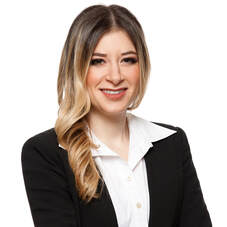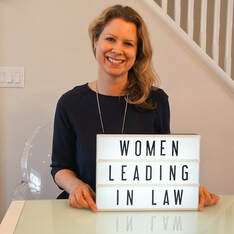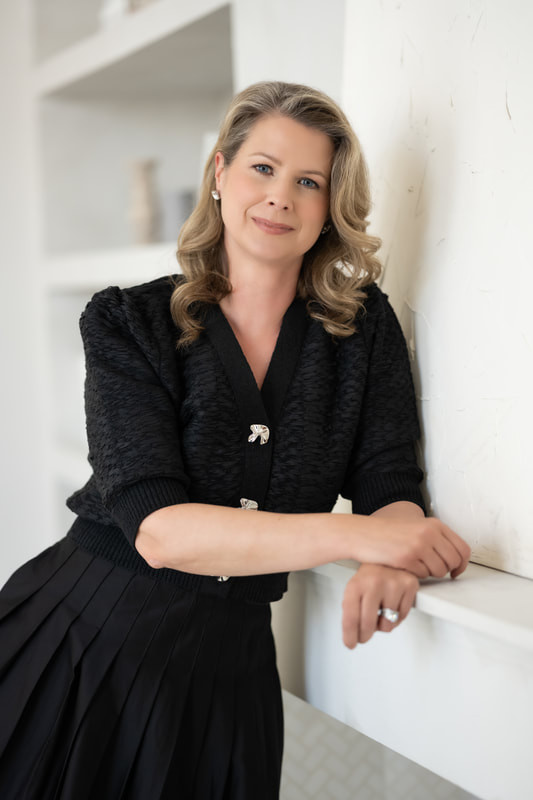 It's back! While I wait for some firms to finish their answers for my Equality, Diversity and Inclusion series, I've decided to re-start the Women Leading in Law series that has been on a bit of a hiatus. So check back here often as both the EDI series and the WLL series (along with my own personal musings on law) will pop up from time to time. For this profile I am featuring Kim Gale, who is no stranger to social media, networking, and building a brand for herself. If I could go back in time to my younger lawyer days I would tell myself, "Be more like Kim". She gets it. Like many of you, I first "met" Kim on LinkedIn (I believe she was promoting her blog, Law for Millennials) and then at a legal networking event. I have since had the pleasure of having coffee with Kim and learning more about her estate litigation law firm, Gale Law. 1. Tell me a little about your practice or business. I practice estate litigation at my own firm, Gale Law. My law firm is representative of my values: legal advice that is straightforward, solutions that are cost-effective and a free consultation where clients can have the comfort to ask questions before paying out of pocket. My clients' issues are deeply personal and I find being compassionate and available is extremely important as an estate litigator. I handle matters relating to estate disputes, some examples include misappropriation of estate funds, passing of a common law spouse, and attorney for property and personal care issues. 2. Why did you go to law school? I decided to go to law school in the UK because I wanted to study in a place where I could travel, and experience new things. I thought I would leave Toronto behind and move to London, England permanently. I always wanted to be a lawyer and I thought if I didn’t give it a shot it would be something I would regret. I felt the same way about starting my own firm - it was something I always wanted to do. I guess I figure the worst thing is living life feeling stuck and not reaching your full potential. Life is too short to not follow your dreams. 3. How did you get to where you are today? Design? Chance? Both? In life there is always a bit of luck! As my mom says, “chance favours the prepared mind” (and according to Google she quoted this from Louis Pasteur). My mom, Reeva Finkel, is a top litigator and senior partner at Blaney McMurtry and I’d like to think I’m following in her footsteps as a female litigator. Having her as a role model has deeply inspired me to believe that hard work and preparation are the keys to success. I still call her (many times) for questions and support. I feel lucky to have her as my strong female role model, in addition to many others, and I got to where I am through leaning on others for support and rolling up my sleeves and working hard. I’m also pretty passionate about what I do – I think it helps to like what you do and want to help others! 4. What is your most significant achievement? What are you proud of? I am proud of the group I co-founded, NCA Network , and the team we put together, in addition to my blog, Law for Millennials and of course, my own firm. NCA Network is a networking group for lawyers and students who went to law school outside of Canada. We are making waves to promote diversity and inclusion in the legal community. NCA stands for the National Committee on Accreditation exams which are the exams you must write to qualify a non-Canadian degree to Canadian standards. I wrote 7 NCA exams while working as a paralegal full-time in the UK and I found the NCA process lonely and difficult. I navigated the NCA process on my own and through this difficult time, I gained knowledge and insight that I wanted to pass along to other students so that they don’t have to go through the same struggle I went through. We hosted our first event at the TLA on March 21 and attendees received 40 minutes of EDI CPD hours. We had the Honourable Justice Thorburn speaking in addition to Isfahan Merali and Atrisha Lewis, and I acted as the moderator. The topic was on diversity and inclusion. Our event was a success with almost 100 attendees! We are excited to make this an annual event and continue to work with the Toronto Lawyers Association and our sponsors. Law for Millennials is more fun – easy to understand legal information focused on issues millennials face! Free, not complicated and not dull. So far all of my co-authors are female lawyers and law students, many from the NCA process, and I love using this platform to promote female lawyers. 5. What are some key challenges, and more importantly, opportunities for women in law? I am blown away about how supportive the legal community, specifically, the support from females, I have received. We understand the challenges of being a female in a (still) male dominated profession. We refer work to each other, invite each other to networking events and try to help each other. I appreciate the support immensely and I try to pay it forward. Through this support, we create grassroots to promote females in the legal profession. Just being given the opportunity to write this blog post is an example of female support - Erin thank you so much for this opportunity, you are a true pioneer and inspiration (and great example of females supporting females). 6. What advice would you give a woman starting her legal career? I like to give advice which reflects on my own experience. When I was working as a paralegal in the UK, I was very out of my element and I thought the only way to fit in was to be someone else. Fitting into the British culture became very important to me. Looking back, I think I would have been much happier if I just stayed true to myself. My advice is to just be yourself. The reality is you’ll be a better advocate and provide a higher service to your clients if you are genuine. It is too much effort to be someone else. People prefer to work with real people anyway. None of us are robots. We have our own personality – why not show yours off! ------------------------------------------------------------------------------------ Thank you Kim for sharing your journey with us. Best of luck with your new firm. ICYMI: Previous posts profiled Alexi Wood, Melissa McBain, Erin Best, Gillian Hnatiw, Melanie Sharman Rowand, Meg Chinelo Egbunonu, Lisa Jean Helps, Nathalie Godbout Q.C., Laurie Livingstone, Renatta Austin, Janis Criger, May Cheng, Nicole Chrolavicius, Charlene Theodore, Dyanoosh Youssefi, Shannon Salter, Bindu Cudjoe, Elliot Spears, Jessica Prince, Anu K. Sandhu, Claire Hatcher, Esi Codjoe, Kate Dewhirst, Jennifer Taylor, Rebecca Durcan, Atrisha Lewis, Vandana Sood, Kathryn Manning, Kim Hawkins, Kyla Lee, and Eva Chan. Sign up to have these profiles sent directly to your email address and stay tuned for the next post soon! I started this blog series because I was tired of hearing about women leaving law and wanted to hear about women leading in law. The "Women Leading in Law" series focuses on good news stories and highlights amazing women succeeding in the legal profession. Each post includes the profiled lawyer's answers to six questions. Prepare to be inspired!
2 Comments
 This month in Ontario, lawyers and paralegals will vote for the next set of “Benchers” at the Law Society of Ontario (LSO). For those unfamiliar with the term, Benchers are the board of directors at the LSO, the regulatory body that governs lawyers and paralegals in Ontario. Bencher terms are for four years. Eligible voters can vote for up to 20 lawyers in the Toronto region and 20 lawyers outside of Toronto. There is a common misconception that Benchers represent lawyers, much like a member of parliament represents their constituents. Benchers actually represent the interests of the public and regulate the profession. Still confused? Precedent Magazine published a helpful article: What do Benchers at the Law Society of Ontario Actually Do? For this election my Twitter and LinkedIn feeds are filled with #BencherElection2019 posts, conversations, podcasts, endorsements, etc. Looking at this level of engagement, one might think that every lawyer in Ontario is super keen to vote and discuss the pressing issues facing our profession. Unfortunately, this is likely far from the truth. Social media platforms, and especially Twitter, can be massive echo chambers. While lawyers on social media appear to be engaged in the election, the historical data on voter turnout suggests that the majority of lawyers are really apathetic. Large Firm Lawyers Vote (Sole Practitioners, Not So Much) The LSO published a comprehensive report on voter turnout, covering election results from 1987 to 2015. Generally, turnout has decreased with every election. 10,287 of the 18,369 eligible voters (or 56%) voted in the 1987 election. Fast forward to 2015. Despite the technological advancement of online voting and a relatively robust #BencherElection engagement on Twitter, 2015 had the lowest percentage of voter turnout in the years documented. Of the 47,396 eligible voters (notice the significant increase in the number of lawyers in Ontario) only 16,040 (or 33.84%) voted. Interestingly, in private practice, the voting-lawyers are from firms of between 76-100 lawyers (over 77% voted in the last election) and firms of over 100 lawyers (over 50% voted). Could this be due to the constant pressure from management to vote for the lawyers who are running from those firms? Hmm. Sole practitioners, who make up the largest category of lawyers in private practice, had the lowest voter turnout for private practice lawyers with only 36.35%. In 2015, only 24.55% of the over 23,000 lawyers not in private practice (lawyers employed in government, corporations, academia) voted. Also, consistently every year, a slightly higher percentage of lawyers who identify as male vote than lawyers who identify as female. In the last election 35.66% of all male lawyers voted, while only 31.23% of female lawyers voted. Why You Should Vote (and Encourage Others to as Well) These statistics tell me that most lawyers do not prioritize the Bencher election. Understandably, many lawyers would prefer to spend time on other aspects of their lives rather than taking the time to research the issues, research the candidates, sit down at a computer, and vote. The problem is that there are several important issues that the LSO (and the newly elected Benchers) will be grappling with, and these issues affect not only the legal profession as a whole, but you as an individual lawyer. I will not discuss the issues in detail here but a few examples: improving access to justice, ensuring lawyers are competent to practice and providing remedial or disciplinary measure for those who are not, the licensing process, entity-based regulation, diversity & inclusion initiatives, the cost of legal education, alternative business structures, etc. In the past, Benchers have made some important (and sometimes controversial) decisions: changing the name from Law Society of Upper Canada to Law Society of Ontario; introducing the Law Practice Program to assist with the articling crisis; deciding not to accredit Trinity Western University; implementing the Statement of Principles requirement; approving the recent public awareness campaign; etc. If you are interested, the minutes and transcripts from Convocation tell you how the incumbent Benchers who are running again voted on past issues (just click on the year on the left-hand side). As an example, these are the Minutes from December 1, 2017 which involved a vote on Mr. Groia’s “conscientious objector” motion regarding the Statement of Principles. All lawyers and paralegals should care about who will be making the decisions about each of these issues. Want to Vote and Don’t Have the Time to Research all those Lawyers? “What do you mean there are 128 lawyers running? I don’t have the time to research all of them!” I know many of you are thinking this and it is a valid observation. I have a few suggestions for you: First, several people and organizations want to make this easier for you and have compiled the information you need for the election in one place. For example, Colin Lachance has organized and published the website LSOBencher.com where the candidates can submit their profile and their positions on the current issues. The Ontario Bar Association has made a website profiling its members who are running. The Law Times also has a website listing the candidates. Sean Robichaud has a podcast featuring some of the candidates. Or you can follow #BencherElection2019 on Twitter. These are just some of the places you can go to get the information you need. Does that still sound like a lot of work? Another option is to seek out a lawyer you trust (and who has the time and interest to do the research) and ask for their recommendations (thanks, Morgan Sim for this suggestion). Or, there is my approach. I really dislike receiving emails and flyers from candidates. Not only do they fill my inbox and recycling container, I do not think it is fair to those candidates who cannot cover the expense for such advertising. Not all candidates can pay for the email list or can afford to have fliers printed and mailed out. For the last two Bencher elections I have made sure not to check off the box on our annual reports allowing Benchers to email me. Instead, I only look at one thing: The Voting Guide provided by the LSO. Each candidate gets one page and one page only to convince me why I should vote for them. I see it as a level playing field for all candidates. I’m not saying my approach is perfect, but as a rather busy person who wants to vote, this is the best use of my time. (Hint: the Voting Guide is searchable if there was a particular issue that interested you, for example, the Statement of Principles.) So, Vote! No excuses this year. Get out and vote. Encourage other lawyers to do the same. You will receive an email from the LSO in the second week of April with a link and explanation on how to vote. Keep an eye out for it and vote by April 30, 2019. Whatever approach you take, I just ask that you take a few minutes to vote and tell all the lawyers in your network to vote as well! |
Erin C. Cowling is a former freelance lawyer, entrepreneur, business and career consultant, speaker, writer and CEO and Founder of Flex Legal Network Inc., a network of freelance lawyers.
Categories
All
Archives
December 2022
|
|
(C) 2014-2024 Cowling Legal. All rights reserved.
|
Please note I am not currently practicing law.
Information on this website does not constitute legal advice and is for informational purposes only. Accessing or using this website does not create a solicitor-client relationship. See website Terms of Use/Privacy Policy. info@cowlinglegal.com
3080 Yonge Street, Suite 6060 Toronto,ON M4N 3N1 (appointment only) |







 RSS Feed
RSS Feed
